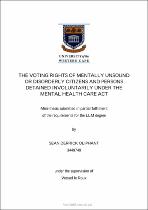| dc.contributor.advisor | le Roux, Wessel | |
| dc.contributor.author | Oliphant, Sean Derrick | |
| dc.date.accessioned | 2023-01-18T08:51:06Z | |
| dc.date.available | 2023-01-18T08:51:06Z | |
| dc.date.issued | 2022 | |
| dc.identifier.uri | http://hdl.handle.net/11394/9508 | |
| dc.description | Magister Legum - LLM | en_US |
| dc.description.abstract | South Africa is a diverse country that plays host to various minority groups. By a minority
group I mean a subordinate group whose members have significantly less power or control
over their lives than members of a dominant or majority group.1 Minority groups form part of
the vulnerable groups in society and may easily fall prey to human rights violations that may
often go unnoticed. Because these groups form a numerical minority, they require sufficient
protection by the law, including effective enforcement of special laws by the government, to
ensure their protection and to prevent political, economic and cultural oppression and unequal
treatment. | en_US |
| dc.language.iso | en | en_US |
| dc.publisher | University of the Western Cape | en_US |
| dc.subject | Voting rights | en_US |
| dc.subject | Elections | en_US |
| dc.subject | Democracy | en_US |
| dc.subject | Mental disorder | en_US |
| dc.subject | Mental Health Care Act | en_US |
| dc.subject | South Africa | en_US |
| dc.title | The voting rights of mentally unsound or disorderly citizens and persons detained involuntarily under the mental health care act | en_US |
| dc.rights.holder | University of the Western Cape | en_US |

